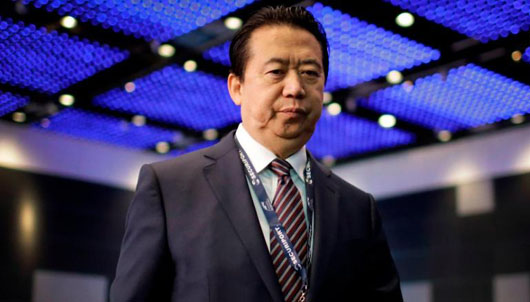by WorldTribune Staff, October 11, 2018
The Chinese government on Oct. 7 confirmed that Interpol President Meng Hongwei had been arrested in China on charges of bribery and corruption.
Authorities in Beijing also said that Meng, a Chinese national, had resigned from his position at Interpol.

According to a report by Geostrategy-Direct.com, Meng had left Interpol headquarters in Lyon in late September on a business trip to China. Upon his arrival at the Beijing Capital International Airport on Sept. 29, he was immediately taken away by Chinese security guards and had not been heard from since.
In April of this year, Meng was stripped of his membership from the Communist Party Committee of the Ministry of Public Security, “a clear sign that he would be the next fall guy” in supreme leader Xi Jinping’s “ruthless purge of the senior officials that have claimed the careers and lives of hundreds of his former and current cohorts in the security and police communities,” the Geostrategy-Direct report said.
Meng’s wife “is reported to have many top secret documents given by her husband as an insurance,” the report said. “The fact that she reported to the French police her husband’s disappearance while in China indicates her willingness to openly antagonize Beijing and make the case an international incident to expose what Meng has on the autocrats in China.”
Meng became president of Interpol in 2016.
Bloomberg columnist Eli Lake called on Interpol to suspend China’s membership over the Meng incident.
“If China doesn’t face consequences for what it has done, then Interpol will be setting the conditions for its own irrelevance,” Lake wrote. “What good is an international law enforcement system that lets rogues act like cops?”
While nearly 80 percent of Interpol’s annual operating budget of about $80 million comes from Western democracies, “authoritarian states have begun to corrupt the organization,” Lake wrote. “Many countries still rely on Interpol to share information on real criminals. But a handful of bad actors have abused the system to target their political foes.”
Ted Bromund, a senior fellow at the Washington-based Heritage Foundation who focuses on Interpol, said: “The problem with the Interpol system is that a lot of nations are not like us and we pretend that they are.”
Lake noted that “there are two possibilities” in Meng’s case:
“Either China nominated a corrupt man to be president of a major international law enforcement agency; or China is detaining an innocent man.”
Whichever way you interpret it, says Bruno Min, a senior policy adviser at Fair Trials, a UK based human-rights group, “It shows disrespect to Interpol.” China has ignored Interpol’s rules before, he says, “and now they are going even further.”
Subscribe to Geostrategy-Direct __________ Support Free Press Foundation
